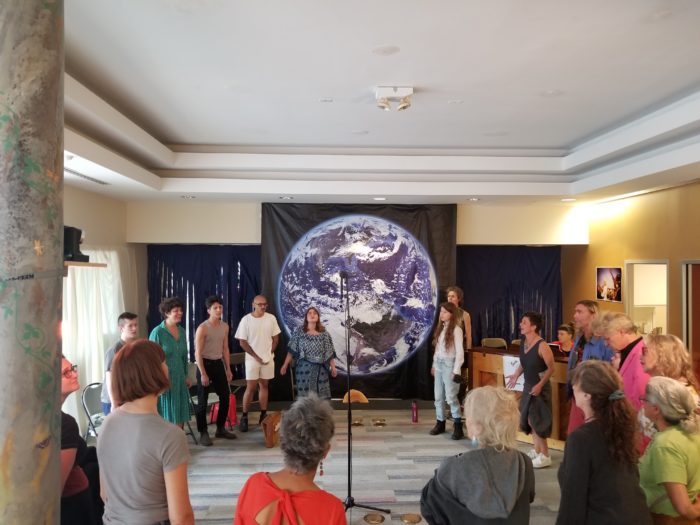“Do we have any Barbara-lujah people here,” William Talen, also known as Reverend Billy asked, his hand raised. The answer from those assembled for a Sunday service dedicated to the late journalist and activist Barbara Ehrenreich was resoundingly affirmative.
Erhenreich, the author of Nickel and Dimed and several other works, died at the age of 81 on Sept. 1. The memorial honored Ehrenreich as a “giant of American activism.” It took place at an Earth Church gathering, a regular Sunday event at the storefront Church of Stop Shopping, 36 Loisaida Avenue in the East Village, Talen said.
“Barbara was like a coach for our activism,” he said in his Saturday email, highlighting Nickel and Dimed, about trying to live on low wages and, Dancing In The Streets, a book she wrote about shared joy and the history of its expression, as impacting the church.

“This is a time in history when that collective joy that our friend Barbara Ehrenreich writes about so well–this is a time when we have to refind that,” Talen said as he prepared ahead of the memorial, “It’s not a rock concert controlled by corporations.”
During her life, in addition to her academic work, essays, and multiple books, Ehrenreich–a democratic socialist–participated in several movements. Past coverage by the New York Times includes her participation in plans to picket outside of Random House after the resignation of an editor, in a conference of left-wing Democratic party activists to urging that the party not drift to the political center in the 1990s, her speech at a protest after the U.S. military sent advisers and additional aid to El Salvador, and another at a rally in favor of abortion rights.
“She came out of a unionist and advocacy activist tradition. She went on countless marches. She thought of herself as part of the radical left,” Alissa Quart, executive director of the Economic Hardship Reporting Project, a non-profit Ehrenreich founded to help independent writers facing and covering difficult financial circumstances.
At the East Village memorial, around 20 people sat in a circle of chairs in the store front, others sat at the edges of the room. A large image of the earth was draped on one wall, a sketch of St. Ehrenreich taped to a piano. The event was an experiment in less orchestrated activity for the group, with participants asked to select readings from Ehrenreich’s work but the meeting largely left to unfold organically, Talen said.
The group clapped and chanted, the chant rising to repeated refrains of “Empathic Research,” near the event’s start, with Talen joining in to sing the phrase, “Justice in the serving,” (which was incorporated into the chant). Then he left his chair to speak to the congregation about Ehrenreich’s work. He emphasized a sense of relationship and conversation formed with the reader by her work and the way it gave primacy to first hand experience.
“We’ve been supported by this remarkable woman and she called the Church of Stop Shopping her church for the last ten years of her life,” Talen announced. “We’re so honored, and now today we’re sort of unpacking why we’re honored, with you.
Emlyn Cameron is a California native now living in New York and a graduate of Columbia’s journalism program. He works as a News Apprentice for Law360’s Tax Authority and freelances in his spare time.










